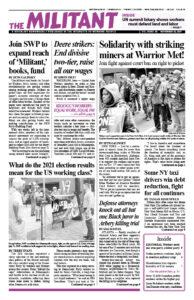Like previous climate conferences, this year’s United Nations summit in Glasgow, Scotland, has been marked by panicked claims that “time is running out” and empty promises by heads of state to reduce greenhouse gases.
The end result? More hot air and little agreement to do anything about contamination of the environment.
Heads of state from 130 countries — but not Russia, China or Brazil — and nearly 40,000 other government and U.N. officials, reporters, members of nongovernmental organizations, and business lobbyists attended the Conference of Parties Climate Change summit 2021, which ends Nov. 12.
“We only have a brief window left” to avoid “catastrophe,” President Joseph Biden told the summit.
“Earth’s climate has changed throughout history,” notes NASA, which had a delegation at the conference. “Just in the last 650,000 years there have been seven cycles of glacial advance and retreat, with the abrupt end of the last ice age about 11,700 years ago marking the beginning of the modern climate era — and of human civilization.” But the U.S. space agency then joins in the panic, claiming the current warming rate “is unprecedented.”
How fast the climate is changing, the extent and impact of these changes, and how much is caused by human activity and how much by nature are matters conference organizers never intended to address. Their alarmist predictions and anti-working-class bent covered up the real cause of today’s environmental problems — the dog-eat-dog capitalist system that puts profits before all else.
The conference president, Alok Sharma, said the goal was to keep global warming under 1.5 degrees Celsius (2.7 degrees Fahrenheit) — beyond which doomsday looms.
Some prophets of catastrophe say millions will die from climate change. But a recent study in Lancet, an online medical journal, found that while 116,000 more people died of heat-related causes they attribute to climate change each year, at the same time some 283,000 fewer people died from cold.
A lot of hot air
While there are real problems, a result of the workings of capitalist production and exploitation, little serious was accomplished. Over 100 governments pledged to reduce methane emissions by a collective total of 30% from 2020 levels by the end of the decade, but acting on the promise is not binding.
More than 40 governments signed a pledge to quit coal in the 2030s or 2040s “or as soon as possible thereafter.” The Chinese, Indian and Australian governments — major producers and consumers of coal — didn’t sign. Nor did Washington, despite Biden’s speech and his blaming Donald Trump for pulling the U.S. government out of previous pacts.
Biden has long talked about decreasing the use of coal and oil, without providing any alternative, condemning millions in semicolonial countries to remain without access to electricity. But on the eve of the summit, the U.S. president demanded the Russian and Saudi Arabian governments increase oil production to drive down prices, and help meet the needs of the U.S. bosses.
More than 100 governments also signed a commitment to halt the destruction of the world’s great forests. But like the other accords, it’s toothless.
It too flies in the face of the needs of workers and peasants in the semicolonial world. Indonesian President Joko Widodo pointed out that a blanket ban on deforestation would affect “millions of Indonesians [who] depend for their livelihood on the forestry sector” as well as farmers who depend on clearing forests to grow crops.
Until working people have our own governments, the earth’s natural patrimony will be endangered by the operation of the capitalist market system.
The London Financial Times reported Nov. 3 that the largest capitalist governments have pledged $100 billion a year to help “poorer countries to cut their emissions and adapt to climate change.” The Times notes that “there is little agreement on how to spend the money, who should receive it or how to make sure it is used effectively.”
Oxfam found 80% of the $79.6 billion pledged in climate financing in 2019 was loans. In other words, payments to banks and bondholders that sink the semicolonial world deeper into debt.
Trade in the “carbon offset market” is booming. Large corporations buy “carbon credits” — investments in “green” industries that offset the carbon they release into the atmosphere — allowing them to claim they are “carbon neutral.”
The Times admits that all of this can be subject to “loopholes in the carbon market rules, such as allowing countries to double count their emissions.”
Former President Barack Obama told participants that youth are frustrated with the failure of “older folks” to deal with the “cataclysmic problem.”
His solution? The same thing he tells U.S. workers every election year. “Vote the issue.”
“Don’t think you can ignore politics,” he said. “You can’t be too pure for it. It’s part of the process that is going to deliver all of us.”
In other words rely on the bosses’ parties, rather than organizing among fellow working people to fight to take control of production out of their hands.
A working-class view
Thousands of young people protested in Glasgow, making more prophesies of doom and demanding “immediate and drastic” cuts to emissions. The summit was a “celebration of business as usual and blah, blah, blah,” Swedish climate activist Greta Thunberg told the crowd.
Absent from the conference — and the protest outside — was a working-class point of view and road forward.
“Workers must not fall into accepting the common view — that is, the bourgeois view — that the environment … is a ‘scientific’ question, a ‘natural question,’ that somehow hovers, above classes and outside the class struggle,” Socialist Workers Party National Secretary Jack Barnes, writes in Capitalism’s World Disorder. “The workers movement has to explain the source of ecological destruction and why the answer lies along the revolutionary line of march of the working class.”
“The workers movement must take the lead,” he writes, “in actively exposing the destruction and dangers produced by capitalism and organizing opposition to them.”


